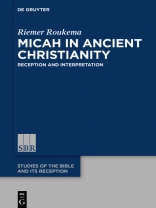What happened when the writing of the Old Testament prophet Micah from the 8th century BCE was read and interpreted by Christians in the 1st to 5th century BCE? This research meticulously describes data from patristic commentaries and other ancient Christian works in Greek and Latin, as well as the remains of Gnostic receptions of Micah, and it analyses the interpretative strategies that were adopted. Attention is paid to the partial retrieval of Origen’s Commentary on Micah, which is lost nowadays, but was used by later Christian authors, especially Jerome. This work includes the ancient delimitation of the Septuagint version and patristic observations on the meaning of particular terms. Other aspects are the liturgical readings from Micah’s book up to the Middle Ages, its use in Christ’s complaints about Israel on Good Friday (the Improperia), and a rabbinic tradition about Jesus quoting Micah. It is noted whenever patristic authors implicitly use or explicitly quote Jewish interpretations, many of which are supplied with parallels in contemporaneous or medieval Jewish works. This first comprehensive survey of the ancient Christian reception and interpretation of Micah is a valuable tool for Biblical scholars and historians.
Yazar hakkında
Riemer Roukema, Protestant Theological University, Groningen, The Netherlands.












